https://tbb-st.thinkbroadband.com/speedtest/ The -standalone- Think Broadband Speed Test 0 4/5 stars ★★★★☆ Hans van der Graaf Hans van der Graaf
The Think Broadband Speed Test gives you the option to test normally (IPv6) or to test based on IPv4. We conclude that, in line with our previous IPv4 versus IPv6 test, it is best to test with IPv4. We therefore recommend using the IPv4 standalone version of the Think Broadband Speed Test.
We advice this speed test if you want to test over IPv6. Please note that it is possible to start the test directly (postcode and provider are optional).
The results at these review page are based on the IPv4 standalone version of the Think Broadband Speed Test.
- Data efficiency: 33/100
- Time to complete: 43/100
- Security: 28/100
- Privacy friendly: 72/100
- Usability: 100/100
- Accessibility: 4/100
- Informative: 70/100
With an adverstised speed of 100 Mbps and an average measured internet speed of 101.0 Mbps, we conclude that the -standalone- IPv4 Think Broadband Speed Test is an accurate speed test (Accuracy score: 100/100).
The -standalone- IPv4 Think Broadband Speed Test is a mainstream speed test. That is, this speed test measures the advertised speed.
Think Broadband is a trading name of Netconnex Ltd. The first occurence on the Wayback Machine of this standalone version is from December 2023.
Embedded or not embedded, that is the question
Think Broadband offers standard an embedded version of their speed test at www.thinkbroadband.com/speedtest.
The standalone version could be found at tbb-st.thinkbroadband.com/speedtest/.
Below you see the differences between these two versions.
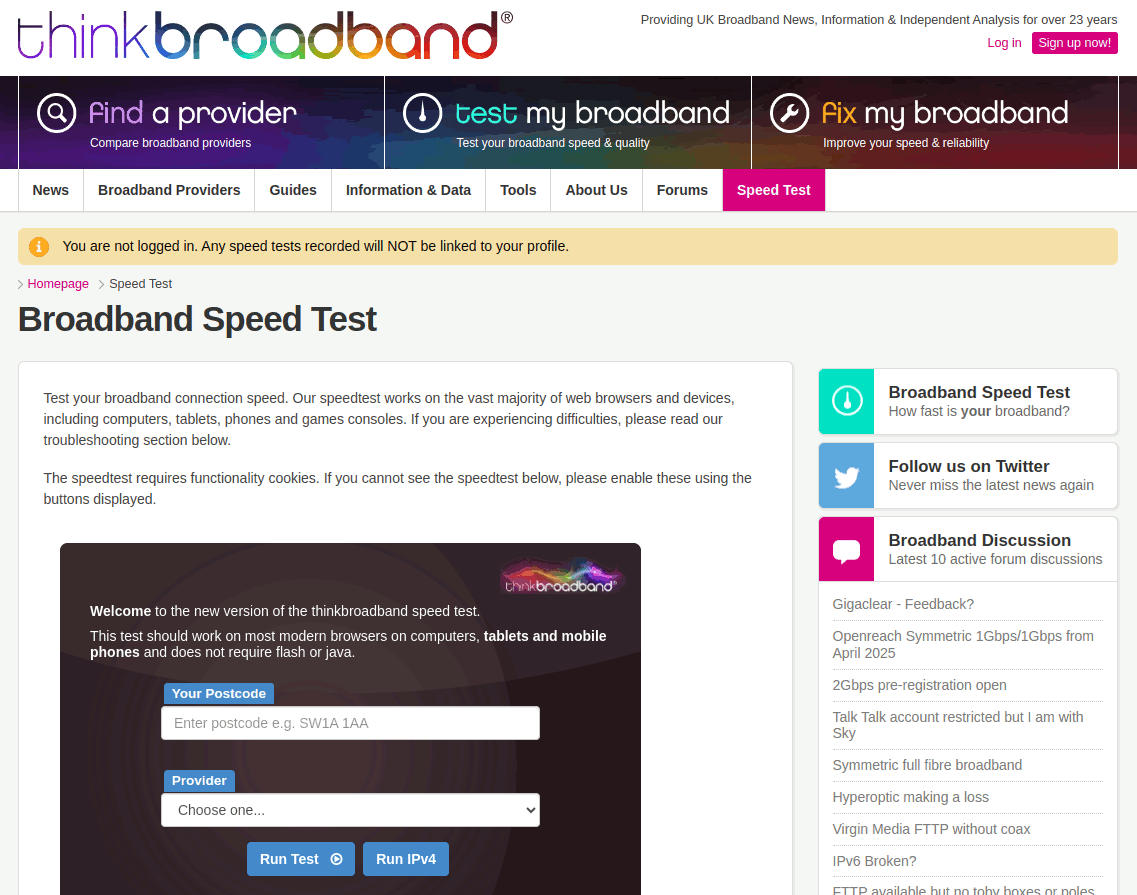
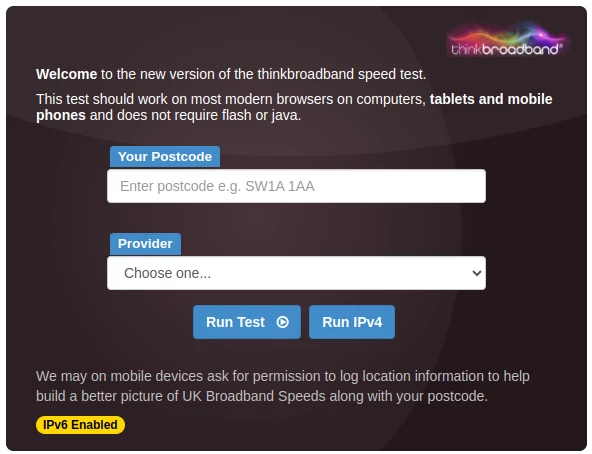
Because we test speed tests and are not interested in another internet provider, we prefer the standalone version.
Note that Think Broadband also offers a third option to test your download speed. They also offer some Download Test Files so you can get an idea of how long it takes to download such a file.
IPv6 versus IPv4
Think Broadband offers you to run an IPv6 test (the default) or an IPv4 test. In line with our findings in the IPv4 versus IPv6 test is that the IPv6 test results are slightly lower than the IPv4 test results.
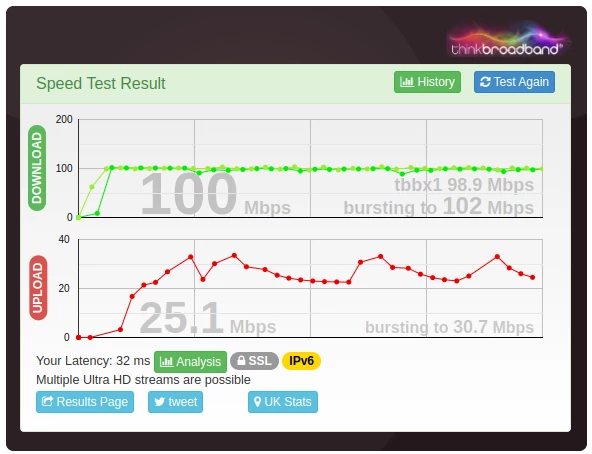 When using IPv6 the average download speed is 99.9 Mbps.
When using IPv6 the average download speed is 99.9 Mbps.
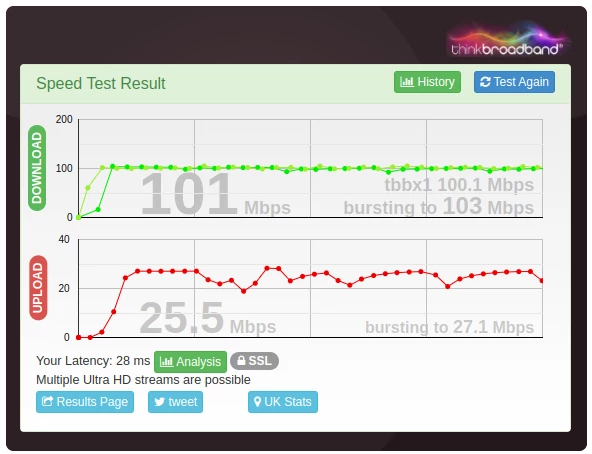 When using IPv4 the average download speed is 101.0 Mbps.
When using IPv4 the average download speed is 101.0 Mbps.
Note that the sweet spot is 100.8 Mbps. That's why we believe the IPv4 test is better than the IPv6 test.
The Think Broadband Speed Test is an original speed test.
Pros
This Think Broadband Speed Test has the following pros:
- The IPv4 version of this speed test is very accurate
- It is possible to start the test directly (postcode and provider are optional)
- It is possible to stop the test
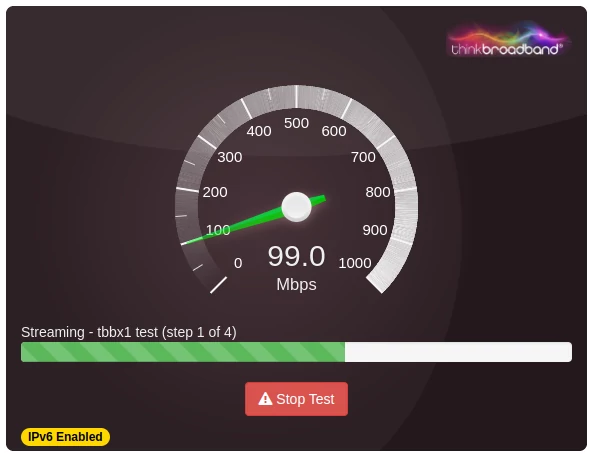
Cons
This Think Broadband Speed Test has the following cons:
- The accessibility of this speed test is bad
- The speed test is relative slow
- A lot of data is used for a test
When to use Think Broadband
If you just want to experiment with speed tests, especially if you want to compare IPv4 with IPv6, then give the Think Broadband Speed Test a try.
How we tested
We have tested the -standalone- IPv4 Think Broadband Speed Test in a standardized way. This makes speed tests easy to compare.
The following results form the basis for this speed test review:
- Abort/pause possible: yes
- Ad-free: yes
- Average download speed of 3 measurements: 101.0 Mbps
- Clear indication of the current focus: yes
- Correct back button behavior: yes
- Flesch Reading Ease score of the privacy policy: 42.02
- Number of ACheckers known problems: 31
- Number of cookies: 5
- Number of measured features: 5
- Number of Wave errors: 7
- Observatory score: 5
- Tingtun score: 86.77
- Total data use of 3 measurements: 751,24 MiBs
- Total time to complete 3 tests: 96 seconds